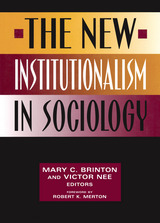2 books about New Institutionalism

The New Institutionalism in Organizational Analysis
Edited by Walter W. Powell and Paul J. DiMaggio
University of Chicago Press, 1991
Long a fruitful area of scrutiny for students of organizations, the study of institutions is undergoing a renaissance in contemporary social science. This volume offers, for the first time, both often-cited foundation works and the latest writings of scholars associated with the "institutional" approach to organization analysis.
In their introduction, the editors discuss points of convergence and disagreement with institutionally oriented research in economics and political science, and locate the "institutional" approach in relation to major developments in contemporary sociological theory. Several chapters consolidate the theoretical advances of the past decade, identify and clarify the paradigm's key ambiguities, and push the theoretical agenda in novel ways by developing sophisticated arguments about the linkage between institutional patterns and forms of social structure. The empirical studies that follow—involving such diverse topics as mental health clinics, art museums, large corporations, civil-service systems, and national polities—illustrate the explanatory power of institutional theory in the analysis of organizational change.
Required reading for anyone interested in the sociology of organizations, the volume should appeal to scholars concerned with culture, political institutions, and social change.
In their introduction, the editors discuss points of convergence and disagreement with institutionally oriented research in economics and political science, and locate the "institutional" approach in relation to major developments in contemporary sociological theory. Several chapters consolidate the theoretical advances of the past decade, identify and clarify the paradigm's key ambiguities, and push the theoretical agenda in novel ways by developing sophisticated arguments about the linkage between institutional patterns and forms of social structure. The empirical studies that follow—involving such diverse topics as mental health clinics, art museums, large corporations, civil-service systems, and national polities—illustrate the explanatory power of institutional theory in the analysis of organizational change.
Required reading for anyone interested in the sociology of organizations, the volume should appeal to scholars concerned with culture, political institutions, and social change.
[more]

The New Institutionalism in Sociology
Mary C. Brinton
Russell Sage Foundation, 1998
Institutions play a pivotal role in the economic functioning of any society. Understanding the foundation of social norms, networks, and beliefs within institutions is crucial to explaining much of what occurs in modern economies. Recently, economic sociologists have explored how ties among individuals and groups facilitate economic activity, while "institutional economists" have focused on the formal "rules of the game" that regulate economic processes via government and law. The New Institutionalism in Sociology argues that a full understanding of economic life will depend on blending these new lines of research on institutions with traditional sociological insights into the social structures that lie at their core. The contributors to this volume explore many questions about the way institutions emerge and operate. How do grassroots mores and practices evolve to an institutional level? How do institutional norms then regulate economic activity, and what are the advantages of formal versus informal constraints? What are the sources of trust and cooperation in trading markets? What role do cultural networks play in the economic survival of immigrant communities? And how does conflict and bargaining affect the evolution of community norms? The New Institutionalism in Sociology also discusses how economic fluctuations arise from interactions between local agencies and the institutional environment. Among the topics addressed here are the influence of labor activism on the distribution of income, the association between highly competitive "winner-take-all" job markets and increased wage inequality in the United States, and the effect of property right conventions on technical innovation and productivity in pre-industrial England. A final section explores how deeply embedded cultural traditions have colored the transition from state socialism to market economies in Eastern Europe. The New Institutionalism in Sociology establishes a valuable template for a sociological conception of economic organization. Its interdisciplinary paradigm signals an important advance in understanding how institutions shape social and economic life.
[more]
READERS
Browse our collection.
PUBLISHERS
See BiblioVault's publisher services.
STUDENT SERVICES
Files for college accessibility offices.
UChicago Accessibility Resources
home | accessibility | search | about | contact us
BiblioVault ® 2001 - 2024
The University of Chicago Press









